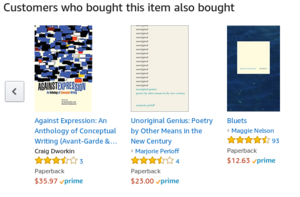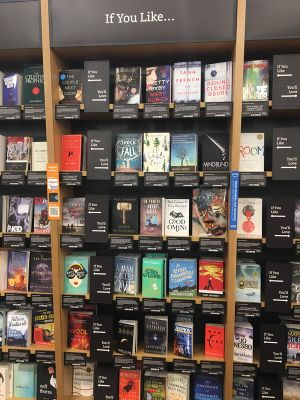User:Joca/rw rm 25042018
Plan for today
I want to use this day to start with the essay on the media object, because I think that the media object can help me as a tool of reflection for the special issue. I am interested in ways to explore a digital collection by serendipity, instead of looking up specific books by their title or the MD5 hash of the file. In that context and related to my previous research, I find it interesting to look at the non-human librarian present in interfaces that people use to access information. There are many forms of this non-human librarianship, like search box with auto complete, or a chat bot that gives advice. In my media essay I'd like to focus however on the recommendation engine: the part of the page we know from Amazon ("people who bought book X also bought Y), to Youtube (next recommended video playing in 10 seconds). This is quite a simple element on the first look, but the mechanisms to offer recommendations changed a lot over time: using hand curated titles, or algorithms based on specific types of data. I think that further research on this object can give me more insights on ways to let people explore a collection, and teach me about the pitfalls of certain methods to offer this functionality.
During the first part of the day I want to make a bibliography of articles that I can use for the essay on the media object. For each article I will make an abstract. During the holidays I will start making synopses of these articles, which I can use as components of my future essay on the media object.
Next to the bibliography and the abstracts, I want to have a reflection about the research done today and how it informed my work for the special issue. Based on that I define some next steps for the project. I plan on starting with the reflection about 1 or 2 hours before the deadline of 17:00 today.
Outcomes
Bibliography & Abstracts
Articles are saved in this Zotero library. From the ones I scanned, I selected the most interesting so far and included them with an abstract below:
“Fiction is outperforming reality”: how YouTube’s algorithm distorts truth.
Lewis, P. (2018, February 2). “Fiction is outperforming reality”: how YouTube’s algorithm distorts truth. The Guardian. Retrieved from http://www.theguardian.com/technology/2018/feb/02/how-youtubes-algorithm-distorts-truth
Abstract
A critical article about the recommendation system of Youtube that is built to optimize the watch time of users, but has a bias towards problematic content like extreme violence and conspiracies as a side effect. The description of the mechanisms behind the system are based on the experiences of Guillaume Chauslot one of the engineers who developed it.
Comparing Recommendations Made by Online Systems and Friends
Sinha, R. R., & Swearingen, K. (2001, June). Comparing recommendations made by online systems and friends. In DELOS workshop: personalisation and recommender systems in digital libraries (Vol. 106).
Abstract
In this article researchers compare the quality of recommendations made by recommendation engines, verses endorsed books and movies by friends of the users. The best recommendations were done by friends, but recommendation systems tend to offer more often new en unexpected results.
Interesting quote: "Since the goal of most RS is to replace (or at least augment) what is essentially a social recommendations by process"
Recommender systems, Part 1 - Introduction to approaches and algorithms
Jones, M. T., Introduction to approaches and algorithms. (2013, December 12). Retrieved April 25, 2018, from http://www.ibm.com/developerworks/library/os-recommender1/index.html
Abstract
An overview of different approaches for recommendation engines, like collaborative filtering, content-based filtering and hybrid methods. Besides describing the methods, the author points out the challenges: scalability when the collection of works becomes larger, and the protection of the private user data used to deliver the recommendations.
Interesting quote: "Use of a recommendation engine is becoming a standard element of a modern web presence."
Sorry, de boekwinkel van Amazon is een van de leukste die ik ooit bezocht.
Pfauth, E.J., Sorry, de boekwinkel van Amazon is een van de leukste die ik ooit bezocht. (2018, March). Retrieved April 25, 2018, from http://edities.medianieuwsbrief.nl/issues/sorry-de-boekwinkel-van-amazon-is-een-van-de-leukste-die-ik-ooit-bezocht-99102
Abstract
In this issue of the Medianieuwsbrief about the physical bookstores opened by Amazon the author lists the aspects he like: among others that all covers are visible, that each book features user reviews that create a sense of being part of a community and the physical adaption of Amazon's recommendation engine in the form of specially ordered bookshelves.
Amazon's recommendation secret
Mangalindan, J. (2012, July 30). Amazon's recommendation secret. Retrieved from http://fortune.com/2012/07/30/amazons-recommendation-secret/
Abstract
The author examines the way Amazon uses recommendation to increase the revenue. Besides automatic recommendations on the website, the retailer uses manual recommendations in emails. These emails are sent to the right users based on their past shopping behaviour.
Interesting quote: “Our mission is to delight our customers by allowing them to serendipitously discover great products,” an Amazon spokesperson told Fortune. “We believe this happens every single day and that’s our biggest metric of success.”
Effects of Social and Temporal Distance on Consumers' Responses to Peer Recommendations
ZHAO, M., & XIE, J. (2011). Effects of Social and Temporal Distance on Consumers’ Responses to Peer Recommendations. Journal of Marketing Research, 48(3), 486–496.
Abstract
This is a research on how people react to recommendations by peers, influenced by their social and temporal distance. One of the outcomes is that close others have a bigger influence on near future decisions, while distant others have more effect on decisions further in time.
Reflection
My reason for collecting articles on recommendation engines was to use this media object as a way to reflect on my own research and attempts to make people discover a pirate collection more serendipitously. The literature I found focused mostly on the algorithms behind recommenders, and featured use cases in commercial settings. These were insightful to understand which data is used (data of users, data of the content of the items, or a hybrid) and that the results are influenced by the goal of the recommendation system: Amazon wants to increase revenue, and will propose complementary products. Youtube prefers to optimize watching time, and will recommend videos that keep people engaged and watching.
Researching the social practice of recommendation
What I am missing however are some more articles about the social practice of recommendation. What is the effect of recommending books to your friends? How does recommendation work outside a commercial context? And following that question, is a pirate library closer to the public library than to a bookshop?
I need to find some more literature on these areas that are missing in my current selection. Concerning the essay on the media object, it also offers an interesting thesis to research: To what extent did the act of recommendation became a commercial practice as it moved from humans to recommendation engines, and why did this happen? Next to that it makes the analysis of this media object more effective as a tool for my project for the special issue.
So, how about the Special Issue then?
For that project, reading about recommendation engines helped in vaguely specifying my direction. These systems currently rely on data on user behaviour to give results. I'd like to look into ways to offer this experience of serendipity and exploration with using different data. For example unusual combinations of meta data to query certain books in a collection. How about books that nobody read? Books written in Russian that are published in Argentina? During the next week I'd like to do some experiments with these query combinations using the LibGen catalog. Based on the outcomes of the literature research and the bootstrapped prototypes I'd like to formulate a provisional research question.


